PRESERVING A MILITARY LEGACY FOR FUTURE GENERATIONS
The following Reflections represents SMSGT Arnold Guiao’s legacy of his military service from 1991 to 2014. If you are a Veteran, consider preserving a record of your own military service, including your memories and photographs, on Togetherweserved.com (TWS), the leading archive of living military history. The following Service Reflections is an easy-to-complete self-interview, located on your TWS Military Service Page, which enables you to remember key people and events from your military service and the impact they made on your life. Start recording your own Military Memories HERE.
Please describe who or what influenced your decision to join the Air Force.

When I was young, I had a chance to attend UC Davis, but my brother requested if I could go to a college near San Francisco. The reason for that was my brother needed me to help in babysitting my two nieces. Eventually, I lost the drive to finish college. I attended multiple colleges like San Jose State University, San Francisco State University, and San Francisco City College. I was not focused on school. I just wanted to hang out with friends, party, and go clubbing to forget my personal problems. Most of my friends in college were graduating or about to graduate and start working in the real world. Finally, at 25, I realized that my life was not going anywhere, so I decided to join the United States Air Force in 1991. I hoped the military would provide me with guidance and direction in my life. Once I started Basic Training on 1 Oct 1991, I knew that this would be my career that would change my life completely. I am so glad that I joined the Air Force.
Whether you were in the service for several years or as a career, please describe the direction or path you took. What was your reason for leaving?

I started my career in Oct 1991 at Lackland AFB for Basic Training and went to Sheppard AFB in 1991 for my Medical Logistics training. But my journey was not an easy path. I was in a delayed recruiting program by my recruiter, which meant that I had to wait within six months to get a guaranteed job. The recruiter promised to give me a medical job once it opened up. Six months later, I was sent to Lackland AFB for Basic Training. Four days before graduating from Basic Training, we met up with our career counselor to find out what our Primary job would be in the Air Force. I was given Security Police, and I was not very happy with that news because all along, I was promised a medical job by my Air Force Recruiter. As soon as I got out of the career counselor’s office, I was shocked and stood around the building to try to process what just happened. A few minutes later, one of my Basic Training classmates came out of the counselor’s office, also pissed. He mentioned that his recruiter had promised him a Security Police job, but instead, they gave him a Medical Logistics job. To my surprise, we both got each other’s dream job in the Air Force. So, we both decided to talk to the career counselor to try to swap our AFSC. He was kind enough to ask his supervisor, and they approved our job swap request. My recruiter promised many new recruits a guaranteed job, so we all filed a complaint against him. Eventually, the Air Force listened and performed an investigation on him. The Air Force sent an Undercover OSI agent to pretend to be a possible Air Force recruit. My recruiter was found guilty of promising guaranteed jobs to new recruits and was eventually kicked out of the Air Force.
So, my Medical Logistic Specialist schooling started in Nov 1991, and I graduated in Dec 1991. Two days before graduation, we were given our assignment, and I ended up getting Keesler AFB Mississippi, and my classmate ended up getting Nellis AFB Nevada. Me and my classmate ended up talking to the SSgt in charge of assignments to see if we could do a swap. They approved our assignment swap request. So, on Jan 1992, I headed for Nellis AFB for my first military assignment. From there, that would be the start of my Air Force career. I had a total of 9 bases, four deployments, and three remote tours in the span of 22 years and eight months.

In January 2012, while I was still stationed at Barksdale AFB Louisiana, I received a one-year assignment to Qatar. This would be a remote and short tour in the Middle East while my family would relocate to Nellis AFB, Nevada, as my follow-on after Qatar. But in March 2012, I received terrible news from my sister from San Diego about my dad’s stage 4 prostate cancer. My wife Donna suggested trying to get a humanitarian to get close to San Diego.
Our request and prayers were answered, and the Air Force gave us Edwards AFB, California, which was 3 hours drive away from San Diego. I would work Monday through Friday at Edwards AFB. Then, I would leave the clinic on Friday around 5:30 pm.. and arrive in San Diego between 8:30 and 9:30 pm to visit my dad/mom, and family. I would return to Edwards AFB by 6:00 p.m. every Sunday. I did this weekly driving routine for over two years so I could spend quality time with my family and both my parents. Our Chief from the Medical Group wanted me to be more active at Edwards AFB. I told Chief I was sorry, but my priority was my dad. Balancing my Air Force career and personal life was very hard. There were many times that I felt guilty because I was not fulfilling all my Superintendent duties. Still, I was thrilled to be there for my dad during most of his medical appointments and when he needed me the most, which were his radiation therapy treatments. If my dad were not terminally ill, I would have definitely put 110% effort into my Superintendent duties for the Medical Support Squadron, be more active in the Edwards AFB community, and at the same time try to be promoted to the rank of Chief. I love the Air Force and my job, but my dad was my priority at this moment in my life. But God had other plans for me and my family.
In 2013, Dr. Sarasua was my Primary Care Doctor at Edwards Clinic. Major James Sarasua informed me that I had some serious illnesses that made me “Worldwide Non-Deployable.” In Jan 2014, the Air Force Medical Evaluation Board decided to Retire me from the Air Force Medically. Finally, I had my retirement ceremony on 2 July 2014 at the Medical Warehouse at Edwards AFB, California. During my retirement, I was awarded the Air Force Meritorious Service Medal for my achievements and accomplishments from 2 July 2012 to 2 July 2014 while stationed in Edwards AFB, CA. The medical retirement gave me and my family a chance to help and care for my dad and mom in San Diego. If I had a chance to do it all over, I would choose to take care of my dad again.
If you participated in any military operations, including combat, humanitarian and peacekeeping operations, please describe those which made a lasting impact on you and, if life-changing, in what way?
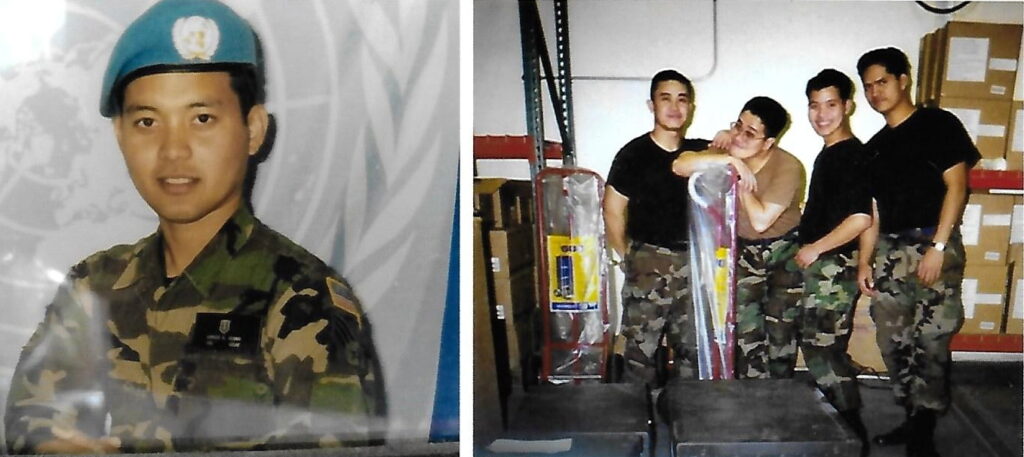
My first deployment was a Joint Task Force, Operation Provide, Promise (Forward) at Camp Pleso, Zagreb, Croatia, from 10 February 1995 – to 4 August 1995 for a peacekeeping operation. There were 6 Medical Logistics from Travis AFB that went on that deployment rotation: SSgt Mario Paman, SSgt Ray Crago, SSgt Rico Squarez, SrA Rod Cabugao, SrA Dan Boutan, and me, SrA Arnold Guiao. We also deployed with SSgt Joel Patria, SSgt Edward Medina, SSgt Jun Bucks, SSgt Dan Carabalo, and SSgt Jojo Limos. Our first deployment taught us perseverance, teamwork, and, most of all, camaraderie. This deployment was advantageous because we survived the hardship of being separated from our families for seven months while serving as North Atlantic Treaty Organization (NATO) soldiers while performing a Humanitarian mission. One summer day, we were attacked by a missile that was flying over Camp Pleso and hit downtown Croatia. That was the first time we ran to the bunkers for our safety.
I also remembered that Camp Pleso had so many mines buried near our Conex, the dining facility, and our walkways in the camp. The mines would be marked with yellow tape and tags with Unexploded Ordnance (UXO) markings. I also recalled SSgt Mario Paman, SrA Dan Boutan, SSgt Joel Patria, and I went to Budapest, Hungary, for rest and recovery during our deployment. We nearly got robbed during our train ride to Budapest. Fortunately, we were light sleepers and were able to stop the robbery. One of the most memorable memories during this Humanitarian deployment was having daily meals and sharing stories with multiple nationalities like the French, Swede, Bangladesh, United Kingdom, Canada, Denmark, Norway, and Turkey soldiers in the Camp Pleso Dining facility. They also had midnight meals at the dining facility. Only a few Senior Airman in the deployment were selected to be recognized. I was very fortunate and proud to be awarded the Air Force Achievement Medal for my deployment in Zagreb, Croatia. To this day, some of us keep in touch at least once a month just to say hi and see how my fellow veterans and their families are doing. I could genuinely say that we bonded for life.
Did you encounter a situation during your military service when you believed there was a possibility you might not survive? Please describe what happened and what was the outcome.
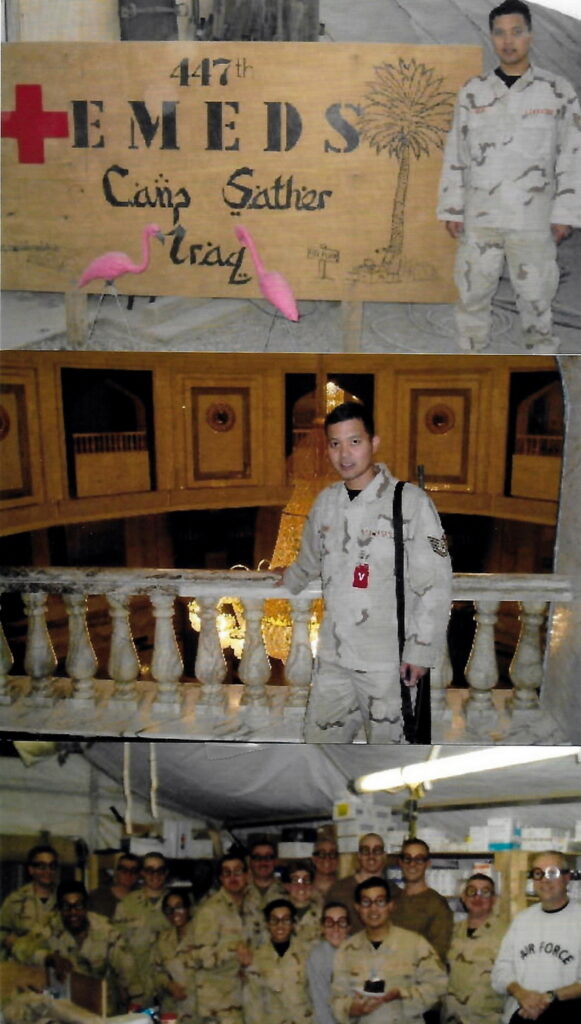
My second deployment was called “Operation Iraqi Freedom”. The location was Camp Sather in Iraq from Sep 2004 – Jan 2005. We were part of the 447th EMEDS clinic. It was my first experience of Combat Landing. It was our first deployment that we experienced a daily mortar rounds attack during our deployment in support of Operation Iraqi Freedom. We were shelled with mortar rounds and heard gunfire almost daily at Camp Sather and the Bagdad International Airport. One of the mortar rounds hit very close to my supply tent; the shrapnel created holes in my supply tent door where I worked. One of the mortar rounds hit our fuel bladder, which exploded in the middle of the night during the first week of our deployment. Also, the attacks on Camp Sather and Baghdad International Airport were so frequent that our Combatant Commander ordered all military personnel to wear our military vest (1-inch plates) and helmets 24 hours a day for four months. I was so scared that I ONLY took off the military vest and helmet when I showered. We only lived in a temper tent, and if we got hit by a mortar round, we had a perfect chance that we would not survive the attack. I would have the military vest and helmet on while I slept to give me peace of mind even though I know that won’t really help if we got hit with a mortar round. We would hear gunfire shots between 1100 p.m. and 4:00 a.m. We did not have a very secure place in Camp Sather.
We have bob wires and some cement walls as our perimeters. We have some cement barricades and a couple of guards with a 50 caliber guarding the entrance. In Camp Sather, there were a few Cement bunkers for us to run in whenever we heard the black alarm in the Giant Voice System, which meant “attack is imminent or in progress.” It felt like we were constantly running to the bunkers daily during the day and night. My job during the deployment was to inventory all medical supplies, replenish the used supplies and outdated supplies, and occasionally do a weekly convoy run between Camp Sather and Camp Victory. I usually have either the Biomedical equipment person or the Officer from Bio-Environmental to accompany me to help replace our H Oxygen Tanks for our patients every week. We had to be extra careful and vigilant because the road between Camp Sather and Camp Victory was approximately 2 miles of unsecured route and had recurring mortar round attacks, gunfire, and improvised explosive device (IED) found on the road. While traveling, we sometimes noticed new giant potholes created by the IED.

One of the scariest moments for me was when one of our medical supply shipments was accidentally delivered to a civilian FedEx location, which was outside the wire. Our Hospital Commander ordered me to retrieve the medical supply. So, the Bio-Environmental Officer accompanied me that day. Once we left the camp, I told the Officer to be ready for anything because I was unfamiliar with that FedEx location. While we were en route toward the FedEx building, we both saw buildings on fire near our destination. It looked like the sniper scene from the movie “Full Metal Jacket.” I remembered that it gave me goosebumps while driving through that creepy place. There had been mortar round attacks, shelling, and gunfire in that area. It looked like a battle zone. The two buildings next to the FedEx building were still on fire.
We were both surprised that this FedEx building was still operational and functioning. So I told the Bio-Environmental Officer to get his M16 ready and be prepared to shoot if needed. I told him to cover me while I retrieved the medical supply from the Iraqi worker. Before getting out of the vehicle, I ensured my M-16 was set for semi-auto. I was so nervous at that moment that I was anxiously looking at 5 to 6 FedEx Iraqi employees with suspicion and distrust while I signed for the package. Once we got the package, I floored the SUV that I was driving and did not stop for anything or anyone until we reached our base camp. I told our Hospital Commander that I was never returning to that FedEx location. I would rather reorder the medical supply than go through that scary experience again.
Some of us never returned the same way, and some of us are still dealing with nightmares, depression, and anxiety. I was very fortunate to return home to my family safe, but I was traumatized after experiencing the bombings and seeing some dead soldiers during our deployment. We saw people die during our deployment caused by rocket-propelled grenades and small arms fire. Most of our staff had never seen any combat injuries and death before, so we were required to have a psychiatrist counsel us occasionally during our deployment period. Because of the small arms fire, bombing, and mortar rounds daily attacks, we were all in fear of possibly losing someone during our deployment. Occasionally, I still have a short temper, flashbacks, nightmares, and anxiety from this experience. I was lucky to have been awarded the Air Force Commendation Medal for my duties and accomplishments during this deployment.
Yes, we were not hurt, but it does not mean we were not in a combat zone. Does it have to kill us or actually wound us to be considered in a combat zone? I believe not. But the deployment wounded us Mentally! There was a big chance that we would actually get PTSD or get injured during our deployment in Iraq. When I got home at Travis in 2004, there was “No Post-Deployment Health Assessment Program” in place. I felt withdrawn, anxious, depressed, very irritable, and high alert, had trouble sleeping, and had frequent cold sweats with nightmares. I was afraid to get counseling or help from a mental health psychiatrist because I was afraid that my unit would find out and kick me out of the service for having PTSD. So, I kept it in for over 18 months and finally opened up to my wife. It was a significant relief that I could vent out to my wife, and SLOWLY, I started improving my mental health. I began to recover with the help of my wife, but it took a while. It was a very long process for me. Then, I deployed at Mindanao in 2009, where they had terrorist Abu Sayyaf Group, and also deployed in Afghanistan in 2010. Now, I’m still getting seen by a psychiatrist from the VA and Vet Clinic for some adjustment disorder, flashbacks, and frequent nightmares.
Of all your duty stations or assignments, which one do you have fondest memories of and why? Which was your least favorite?

Of all my duty stations or assignments, Kadena Air Base-Japan would have the most fondest memories. This assignment has beautiful beaches, for example, Okuma Private Beach & Resort. They had miniature golf, tennis courts, go-carts, and a pristine beach. Okinawa has nice restaurants with reasonable prices, like Dragons, All You Can Eat “King Kong,” and Kadena Marina Restaurant, right beside the beach. They also have a great NCO club, Airman’s Cub, and the Officer’s Club. The NCO club had happy hour Fridays and free food from 5:00 – 7:00 p.m. Beer was just $1.00, so SMSgt Arenas and a few MSgt hung out every Friday to mentor and have some fun. The Airman’s Club had happy hour Monday – Thursday. The Officer’s Club allowed the enlisted to enjoy their happy hour Monday – Thursday. So, free food almost every day, and the best thing was the Airman, NCO, and Officer’s Club were all within walking distance from our base housing.
Kadena also had a membership night once a month sponsored by MWR. So we had beautiful free dinners and a chance to win monthly prizes. We also loved playing Bingo inside the base. They have the biggest BX in PACAF (2 stories with a Hugh food court), which resembles a Super Walmart. Kadena AB is a very family-oriented assignment. We met some great friends like Lt Commander Randy Manalang, SMSgt Marcos Arenas, Reggie Arenas, TSgt Del Amante, Cora Amante, MSgt Kathleen Garcia, and Omar Garcia. It reminded me of the Island of Hawaii, humid but it is an Island Paradise for families.
My most minor favorite assignment would have been Nellis Air Force Base Nevada. This was my first assignment, and it was really hot. I lived in the dorms, where I had a roommate for over 18 months. I rode my bike to work, and a lot of times, the weather was very, very hot. There were few things to do for a new Airman inside the base. I just pretty much went to work and played tennis. The main thing to do in Nellis AFB was to drive to the central Strip and gamble. I knew people who gambled and got hooked. I had a dorm manager, a TSgt, who got busted down to a Senior Airman because of his gambling problem. I did gamble after work. I played poker and did okay because I was decent and patient. But I did not want to just gamble and go to work day in and day out. So, I volunteered to take Osan AB to get out of Nellis AFB. So, in July 1993, I PCS’d to Osan AB, Korea. It was one of the best decisions in my military career.
From your entire military service, describe any memories you still reflect back on to this day.

One of the best memories I kept reflecting on is my deployment in 2009 to Zamboanga, the western part of Mindanao, Philippines. I almost did not go to the Joint Special Operation Task Force – Philippines deployment because my Superintendent of Medical Support Squadron (MDSS) did not want me to go. Initially, I was ordered to go by my OIC for this deployment because I was the only Master Sergeant in Medical Logistics that could go. We had three Master Sergeant, but the other two could not deploy because one was retiring and the other was pregnant. I was supposed to shadow the retiring Master Sergeant for six months. Still, we were butting heads because we had different opinions on running the Medical Logistics Operations and Flight. Also, I was the only choice, and our PACAF Chief needed a Master Sergeant to deploy from Kadena AB because they wanted a Senior NCO to fix some Logistic issues at the deployed locations. I know our Superintendent of MDSS was not happy with me, but I ended up deploying and had no regrets.
Before the deployment, my brother and I had to help prepare for my dad and mom’s 50th Wedding Anniversary, which was held at Betis Church in Pampanga, Philippines. I could not disclose any information about my mission to my relatives in the Philippines because it might put my relatives in danger. One week after the 50th Wedding Anniversary, I had to fly to Zamboanga. I was expecting someone from the US camp to meet me at the airport, but no one showed up. Most of the Muslims at the arrival section of the airport were wearing turbans. I was kind of nervous because Muslims surrounded me, and I was unsure if they were friendly Muslims or supporters of the Abu Sayyaf group. Luckily, four Philippine Army soldiers were picking up their General from the airport. Fortunately, I could speak Tagalog and requested if they could give me a ride back to their base. I mentioned that I was a US soldier, and my ride did not show up. I only knew that our satellite base was inside the Philippine Army base called Camp Navarro. The Philippine Army soldiers mentioned that if the General did not arrive at the airport, they could bring me back to their camp, Camp Navarro. As luck would have it, the General did not come, so they were able to bring me to Camp Navarro.

I was still nervous because I was unsure if I could trust them where they were getting me; during our drive towards the camp, I saw a poster board for “Wanted US soldier,” unsure of the reward money offered. I was ready to use my M9 pistol just in case I had to use it during a bad situation. I am so glad the soldiers were friendly and brought me to their Hospital inside Camp Navarro. I met their Commanding Officer from their Hospital, and she ordered the Philippine Army Sergeants to drive me to the US Clinic inside Camp Navarro. When I finally arrived, I overheard our Surgeon General Major Bicaldo and Navy Chief Rudy Fernandez talking about me. They were wondering which day I should arrive at Zamboanga airport. There must have been a miscommunication of my date of arrival. All I know is that no one from the camp knew I was coming that day.
I am just so glad that I made it safely to Camp Navarro. Once I arrived at Camp Navarro, I was introduced to the J4 (Logistics) staff and the medical staff and became part of the Critical Care Evacuation Team. The Critical Care Evacuation Team had to work many hours supporting the Philippine Army and Philippine Air Force soldiers at Mindanao and Jolo, the primary island of the province of Sulu. We had an opportunity of a MEDCAP, which provided increased outpatient care for Philippine civilians living in rural areas. We helped educate the Philippine Army medics and the Philippine Red Cross with the Intravenous Therapy training. But even though this deployment had a lot of challenges, I am so glad that I took this deployment. It was an honor and my pleasure to have served with Major Bicaldo (Surgeon General), Chief Fernandez (Navy Medic), Major Kaderbek (Flight doctor), and Staff Sergeant Brad Becker (Army Respiratory Therapist). I can genuinely say that we saved some lives during this deployment and made a big difference with the fight against Terrorism. A few weeks after I arrived back in Kadena AB, someone from Headquarters Hawaii contacted our Medical Logistics Superintendent, SMSgt Brown. They notified him that an Article would be written about my deployment experience from the Philippines.
I know back home that my Superintendent of MDSS was not very happy with me that I took this deployment. So, the SMSgt prevented me from getting a chance to be promoted on the 2010 SMSgt promotion cycle by NOT getting the Senior Rater’s Approval and signature on my Enlisted Performance Report, which I was fully qualified to get. I took this negative energy and anger towards my Superintendent and my OIC and re-channeled it to a positive attitude so I could focus on doing my best on my future assignments. So, this obstacle did not stop me; it just fueled me more. I knew I wanted to make rank, and I was very persistent once I put my mind to it. Faith would have it that my old Officer in Charge and old Superintendent from Kadena called me one week before I PCS to Barksdale. They requested me to PCS to Yokota, Japan, because their MSgt was retiring, and they said they needed a strong and capable MSgt to run their Medical Logistics Flight. My family and I would have loved to be stationed in Yokota, but I declined their request because I did not want to work for them again and did not want them to have any control over my career. I have learned my lesson and don’t want it to happen again. In the end, I had the last laugh because I ended up PCSing to Barksdale AFB, Louisiana. It was the best thing that ever happened to me in my Air Force career.
I worked with great folks like MSgt Person, TSgt Herzfeld, Major Johnson, Chief Johnson, and Lt Col Foutch. I was able to work very hard, mentor my subordinates, shine, and get recognized by the MDSS Commander, Med Group Chief, and the Hospital Commander. In 2010, at Barksdale AFB Louisiana, I was selected as the Global Strike Command Medical Logistics Senior Noncommissioned Officer of the Year as well as the 2nd MDG Senior Noncommissioned Officer of the Year 2011 and the MDSS Senior Noncommissioned Officer of the Year 2011. Also, the Medical Logistics Team won the 2010 Air Force Global Strike Command Medical Logistics Small Account of the Year. Furthermore, I was rated #1 of 8 MSgt in the Med Group and Started #18 of 302 MSgt for Barksdale AFB. Fortunately, that gave me enough points for my board score to be promoted to SMSgt. I always told my subordinates, “Always do your best whatever you are doing, Always train, mentor, and counsel your troops, and Always stay persistent.” In the end, all the hard work will pay off.
What professional achievements are you most proud of from your military career?
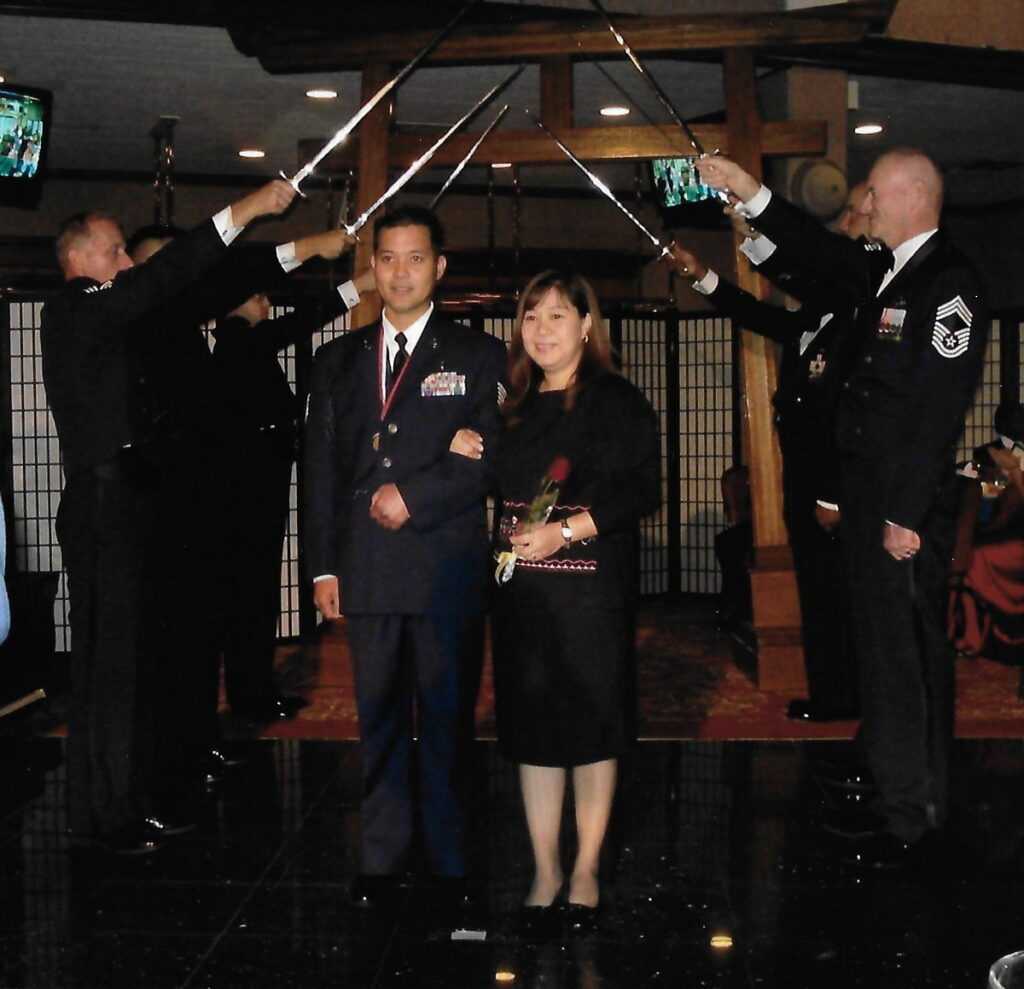
In 2006, at Kunsan AB Korea, our Clinic was named “Top Performing Military Treatment Facility” and Overseas Small Clinic of the Year. It was selected in October 2006 “Pride of the Pack” by the Wolf (Wing Commander). In 2008 and 2009, our Clinic won the Pacific Air Forces Outstanding Logistics Account of the Year at Kadena AB Okinawa, Japan. I was promoted to Master Sergeant in March 2008 at Kadena AB. In 2010, at Barksdale AFB Louisiana, I was selected as the Global Strike Command Medical Logistics Senior Noncommissioned Officer of the Year as well as the 2nd MDG Senior Noncommissioned Officer of the Year 2011 and the MDSS Senior Noncommissioned Officer of the Year 2011. Also, the Medical Logistics Team won the 2010 Air Force Global Strike Command Medical Logistics Small Account of the Year. In 2013, at Edwards AFB, California, The Medical Logistics Team won the Air Force Material Command Medical Logistics Account of the Year. In my 22 years and eight months of active duty, I was recognized and awarded 3 Meritorious Service Medals, 1 Joint Service Commendation Medal, 6 Air Force Commendation Medals, and 2 Air Force Achievement Medals. Finally, I was promoted to the rank of Senior Master Sergeant on 1 March 2013 at Edwards AFB, California.
Of all the medals, awards, formal presentations and qualification badges you received, or other memorabilia, which one is the most meaningful to you and why?
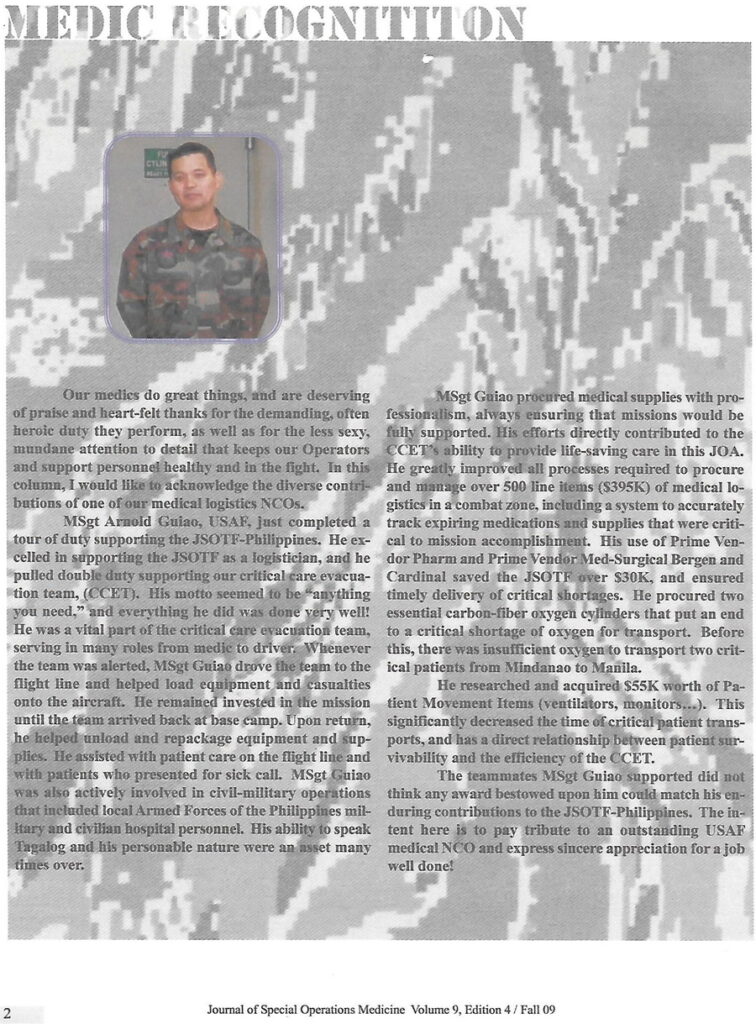
The most meaningful memorabilia was an article written by my Critical Care Evacuation Team (CCET) and was published in the “Journal of Special Operations Medicine” in Fall 2009 Volume 9 Edition 4. The CCET consisted of 1 doctor, 1 Army medic, and 1 Air Force medic/medical logistic. Our doctor was Major Kaderbek, the Army medic was Staff Sergeant Brad Becker, and I was the Medical Logistic NCO for our CCET. During that deployment, our CCET treated, transported, and supported the Philippine Air Force and the Philippine Army when they got wounded during the war with the Abu Sayyaf Group (ASG). We mainly supported Camp Navaro, Camp EAB, Camp Aguinaldo, and Camp Jolo. The ASG is considered one of the most vicious Islamic groups working in the southern Philippines and encourages an independent Islamic state in western Mindanao. The ASG currently participates in bombings, abductions, assassinations, and coercions. The Abu Sayyaf Group works mainly in Basilan, Sulu, and Tawi-Tawi Provinces in the Sulu Archipelago and has an overwhelming presence in Mindanao. During our deployment, an Air Force inspector traveled from Camp EAB Air Force base to Jolo, where he got shot. The CCET stabilized the patient and transferred him to the closest civilian Hospital, where the doctors operated, removed the bullet safely, and fully recovered. CCET was recognized and received the Joint Service Commendation Medal for saving the life of an Air Force Inspector and also providing medical care for four military camps in the Philippines. So, our CCET was vital in the mission of the Joint Special Operation Task Force-Philippines to fight against terrorism and communism. I was so proud and honored to have been part of the Critical Care Evacuation Team in Zamboanga, Philippines, in 2009.
Which individual(s) from your time in the military stand out as having the most positive impact on you and why?

MSgt Joefred Devicais, MSgt Mario Paman, SMSgt Howard Dildy, SMSgt Travis Gillespie, SMSgt Florimond Munar, SMSgt Marcos Arenas, and Donna, my dearest wife, had guided, supervised, supported, and mentored me during my military career. I would not have made it this far without their guidance and support during my military career’s hard and challenging times. I sincerely and truly appreciate everything that they have done for me and my family. I still keep in contact with most of them, even though they are all retired, too. You will all be remembered by me for all the counseling and helpful advice you gave me throughout my military life. You all taught me to train, counsel, mentor, and take care of my subordinates first. I always recognize my troops for doing an outstanding job for the Logistics Flight and Medical Support Squadron either by saying “Thank you for a job well done” or writing them an award package that genuinely deserves them. I also learned to pick and choose what good traits each of my supervisors had taught me. Most of all, they all led me to always do the right thing, whether someone is watching me or not, even if the path is more challenging for doing the correct thing. You all pushed me to be a better Noncommissioned Officer and finally reach my goal as Senior Master Sergeant in our Career field. Thank you so much to all my past supervisors, good friends, and especially my loving wife, Donna. She helped me numerous times in my military career by assisting me in uploading over 1,800 Quality Assurance Data of supplies and equipment of Patient Movement items worth over 18 million dollars into DMLLS and proofreading memorandums, Evaluation Performance Reports, and e-mails before submitting them to my bosses and commanders. Donna also raised three kids while working, kept the family safe, and solved all the problems and challenges back home while I was deployed four times and had to do three remote tours during my military career. I can genuinely say that my wife Donna was the “Captain” of our ship. Donna had to sacrifice so much for my career. There is no way I could have succeeded without the support and sacrifice of my dearest wife, Donna. Donna is my Rock.
List the names of old friends you served with, at which locations, and recount what you remember most about them. Indicate those you are already in touch with and those you would like to make contact with.
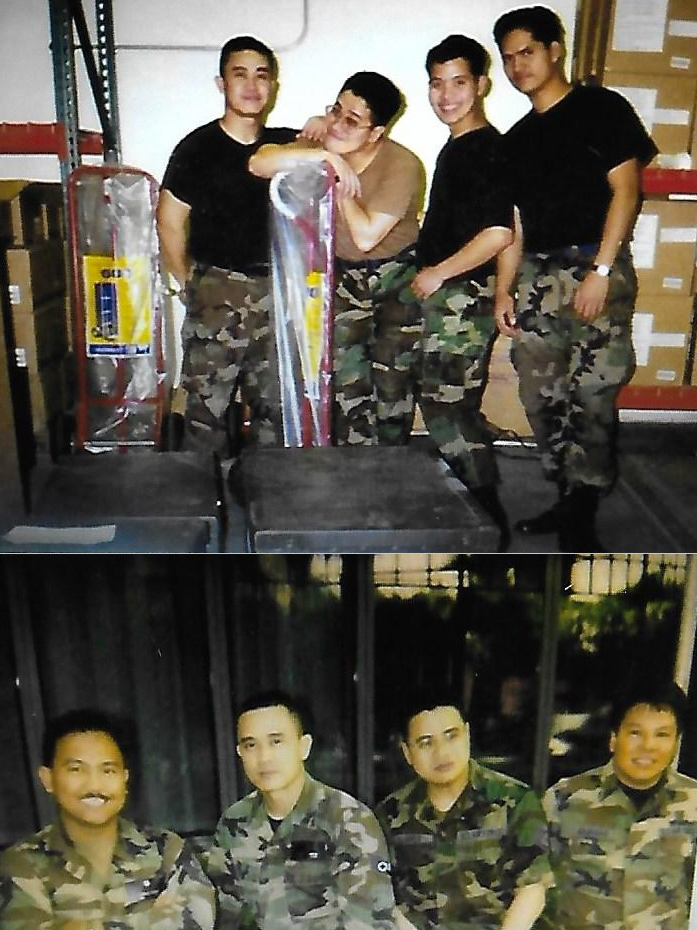
MSgt Joefred Devicais, MSgt Mario Paman, and TSgt Octavio Suarez were all my supervisors at Travis Air Force Base. I was deployed with MSgt Paman and TSgt Suarez in Croatia during Operation Provide Promise from Feb 1995 – July 1995. MSgt Devicais was my supervisor at Prime Vendor. I remember he gave me a 5 in my Evaluation Performance Report, but it was not a Firewall 5. On that day, I learned to talk to my supervisors so that I know what to do to be able to attain a Fire Wall 5. MSgt Devicais has taught me a valuable lesson in the military: to be proactive and always ask for feedback to know what your weakness is so that you can improve yourself. I am still currently in touch with MSgt Paman and MSgt Devicais. They will always be my close friends and Military Buddies!
Can you recount a particular incident from your service, which may or may not have been funny at the time, but still makes you laugh?

I was stationed at Kunsan Air Base from June 2006 to June 2007. I was the NCOIC of Medical Materiel, and TSgt Mark Person was the NCOIC of Biomedical. While stationed at Kunsan, Korea, our base required us to play War games in which The Wolf (Base Commander) tested our capabilities during wartime. One of our jobs is to guard and deliver medical supplies to the clinic. While the BMETs would repair medical equipment and also perform par sweeps around the clinic for Unexploded ordnance (UXO). Most of the time, we would be on Mission Oriented Protective Posture (MOPP) Gear. The Wolf would see how well we handled stress and how we performed during chemical warfare. Our BMETs had two Par sweep teams for the Medical Group, which TSgt Mark Person led. They perform a full sweep around the clinic’s Medical buildings. The other Groups also had their own Par sweep teams, and they would check all the surroundings. The Med Group Par sweep teams would always clear and report their findings to the Military Coordination Commission (MCC) first. They were the Top Par sweep teams in Kunsan AB. Well, one day during the exercise, the exercise evaluation team (EET) injected a chemical bomb near the entrance of the clinic. I remembered the par sweep team was in full MOPP gear for more than 2 hours in the hot and humid weather, so I knew they were hot, sweaty, and uncomfortable. TSgt Person opened the entrance door of the clinic, contaminating the staff and patients. So the EET killed off TSgt Person and sent him to the pit, where he would spend the rest of the exercise filling in sandbags.
The worst thing is that I believe TSgt Person was killed in the last 7 minutes of the base exercise. On another base exercise, TSgt Person ran for cover near a conex during MOPP 4, and the Wolf noticed that TSgt Person did not have the sense of urgency to put on the MOPP 4 gear on. So, TSgt Person got in trouble by the Wolf. But later in his tour, TSgt Person volunteered with the Korean school and got personally recognized by the Wing Commander for his job well done. The Wolf personally coined TSgt Person. So when the Wolf was presenting his excellence award, the Wolf looked twice at TSgt Person because he recognized him on a previous encounter during a base exercise. I will never forget this incident and smile.
Three years later, MSgt Person and I would be stationed together at Barksdale AFB, Louisiana. One of the best assignments I ever had was at Barksdale AFB 2010 because I had a great tour with my close friend Mark. MSgt Person and my Medical Logistics Flight made our time in Barksdale very enjoyable and fulfilling. I can genuinely say that Mark was very knowledgeable at his job, and he was the backbone of the BMET shop. Lt. Col. Foutch trusted and appreciated MSgt Person’s professionalism, so he appointed Mark to be the Squadron Superintendent for the Medical Support Squadron. Lt. Col Foutch would occasionally catch Mark and me doing high five and laughing in the hallway. Our Commander thought that we both were up to no good, but in reality, we both were enjoying our tour together. We pick up lunch together at Walmart, and surprisingly, an old couple pays for our lunch. We both volunteered to be escorts for the Nuclear Surety Program and met high-ranking officials from different countries. We both received orders to leave Barksdale almost simultaneously, and Lt. Col. Foutch caught us celebrating in the hallway. We both purchased our home around 2012, Mark went to Colorado, and I went to San Diego. Until now, retired MSgt Mark Person is one of my best friends, and I will always keep in touch. I will never forget him and respect him. He is brilliant, one of the hardest working BMET, and a great Senior Non-Commissioned Officer that I have ever served with. Retired MSgt Mark Person now works for the VA in Colorado and is doing an excellent job maintaining all the medical equipment in the Hospital. The VA hospital is fortunate to have him as part of the Biomedical Team. I am truly honored to have met and served with retired MSgt Mark Person.
What profession did you follow after your military service, and what are you doing now? If you are currently serving, what is your present occupational specialty?

While serving in the United States Air Force, I was a medic, and my official title was Medical Logistics. We would buy all the medical supplies, pharmaceuticals, equipment, and furniture for the Hospital. We also managed the War Reserve Materiel used during deployments either for Wartime or Humanitarian purposes. After I retired from the military, I started working at Sharp Grossmont from 2015 until 2020. I was the Medical Supply Coordinator for the Grossmont Plaza Surgery Center, and I inventoried and purchased all medical supplies, tissues, lenses, and implants. I also made sure all consignments were present, along with the Reps involved in all the surgeries. I was responsible for creating the levels and providing financial reports to our Nursing Manager and Operating Officer.
What military associations are you a member of, if any? What specific benefits do you derive from your memberships?
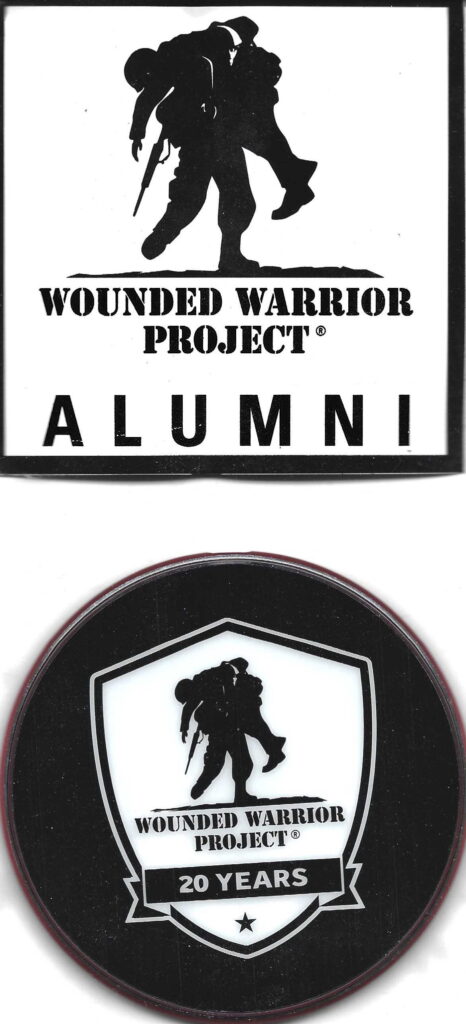
I am a member of the Wounded Warrior Program. Being a member of Wounded Warrior is a great honor and respect. Wounded Warrior Program offers physical and mental wellness, career transition, and support in obtaining disabled veterans benefits from Veterans Affairs. Most of all, the Wounded Warrior Program showed us that people APPRECIATE us and will never forget our sacrifice/service as Veterans of the United States. It was an honor and pleasure serving in the US Air Force. Wounded Warrior Program made us feel that our Great Nation Never forgot us!
In what ways has serving in the military influenced the way you have approached your life and your career? What do you miss most about your time in the service?
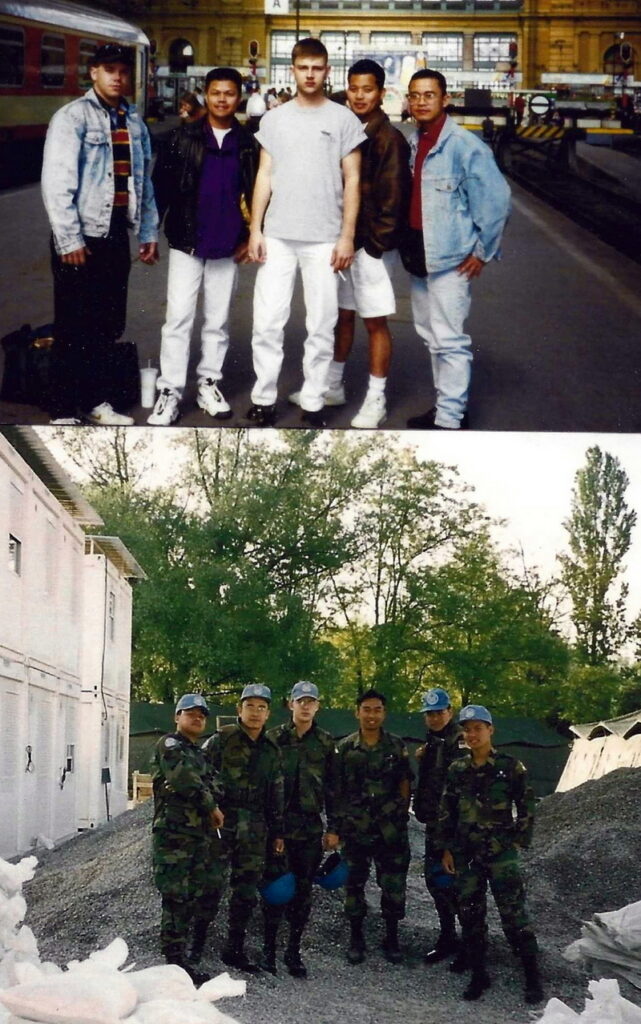
Always do your best whatever task you are given, Stay persistent, and Always do the right thing whether someone is watching you or not. I used the same rules for everything I do, whether at work or home doing projects. I also preached to my kids to always try their best whatever they are doing, such as show choir, tennis, school, and work. I told them It would give them great satisfaction that they gave it their Best Always. My oldest works for NASA as a Mechanical Engineer (GS-13 within five years), my second works as an Accountant as a contractor for the Space and Naval Warfare Systems Center (SPAWAR), and my youngest will graduate as a Teacher with a Master’s Degree! I am so Proud of all my children because they are kind, humble, and Always try their best whatever they do!
What I missed the most about the military is the camaraderie and the friends I made from each base and deployment. Comradery is very important to me because it means I have a Wingman that I can trust and will always be there for me, and they can ALWAYS count on me whenever they need me!
Based on your own experiences, what advice would you give to those who have recently joined the Air Force?
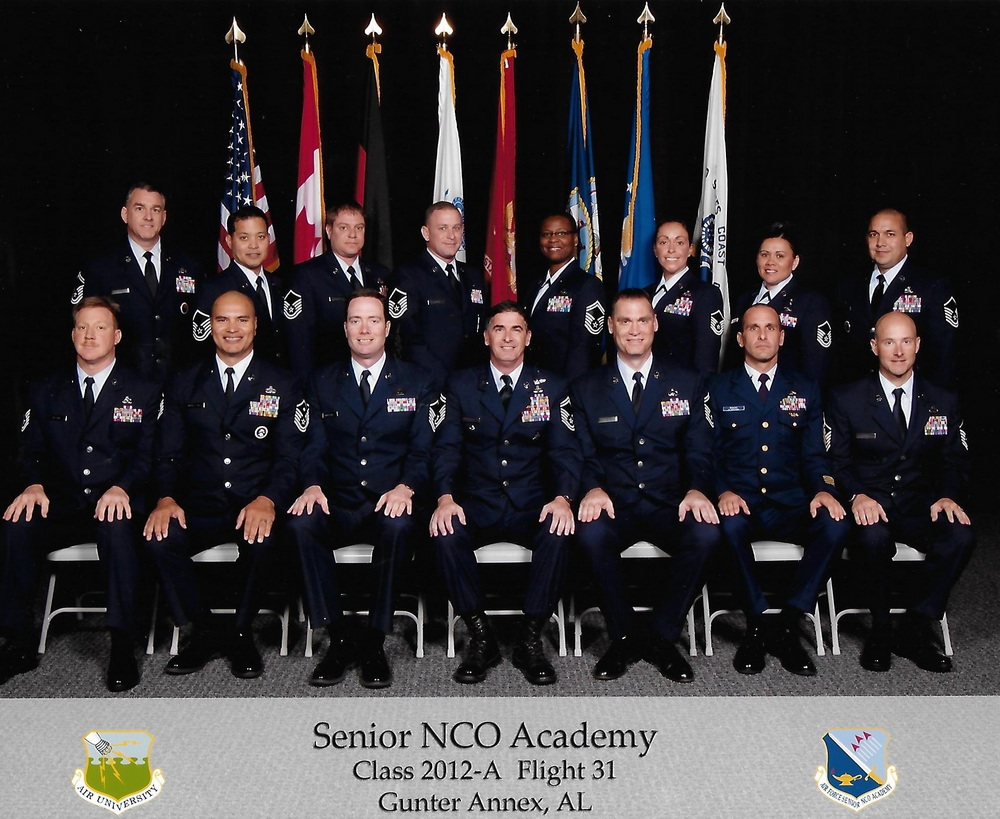
Suppose you give your 120% in your job while in the United States Air Force; you will be successful in your career. I always told my subordinates, “Always do your best whatever you are doing, Always train, mentor, and counsel your troops, ask your supervisors for feedback, and Always stay persistent/Never give up.” In the end, all the hard work will pay off.
In what ways has togetherweserved.com helped you remember your military service and the friends you served with?
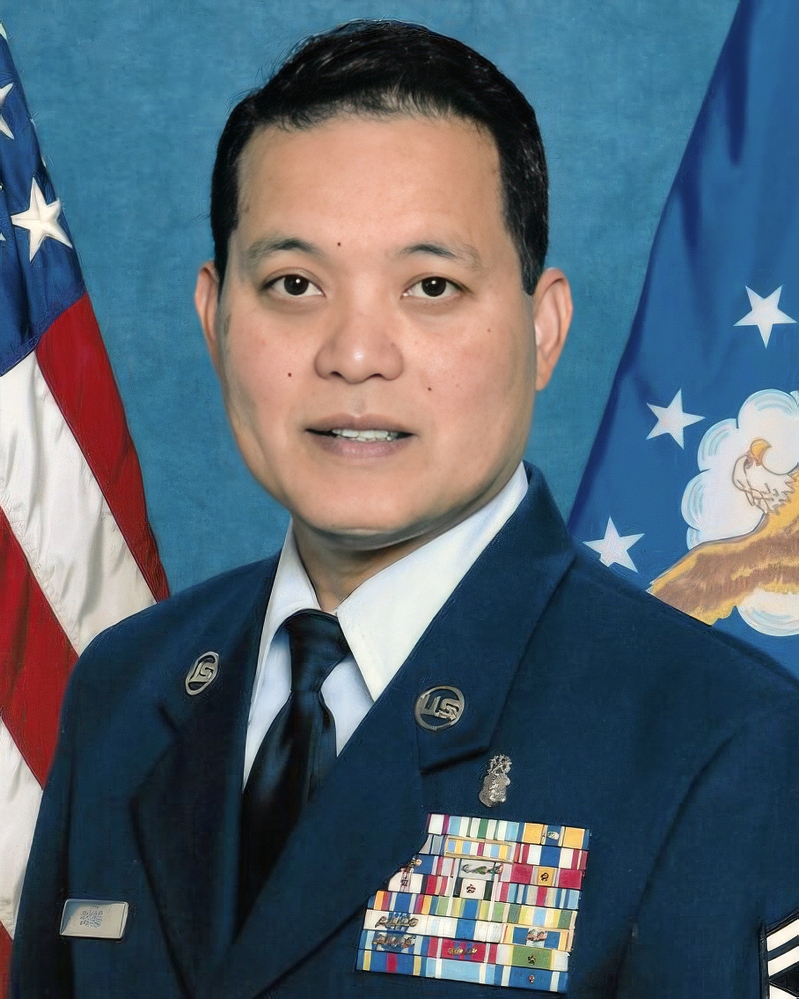
TogetherWeServed.com helped me remember my military service and the friends that I served with by the way the questions were laid out. I was able to reflect on all the important and special assignments that I had. I recalled all the deployments and which one scared me the most. The questions also reminded me of my United States Air Force achievements. It made me remember the Core Values the Air Force taught me throughout my career. I am very proud to be an Air Force Veteran and would do it all over again if given a chance!
Thank you, TogetherWeServed, for making me remember all the great memories I have in the military. You have allowed me to pass on my legacy to my children and grandchildren.
PRESERVE YOUR OWN SERVICE MEMORIES!
Boot Camp, Units, Combat Operations
Join Togetherweserved.com to Create a Legacy of Your Service
U.S. Marine Corps, U.S. Navy, U.S. Air Force, U.S. Army, U.S. Coast Guard
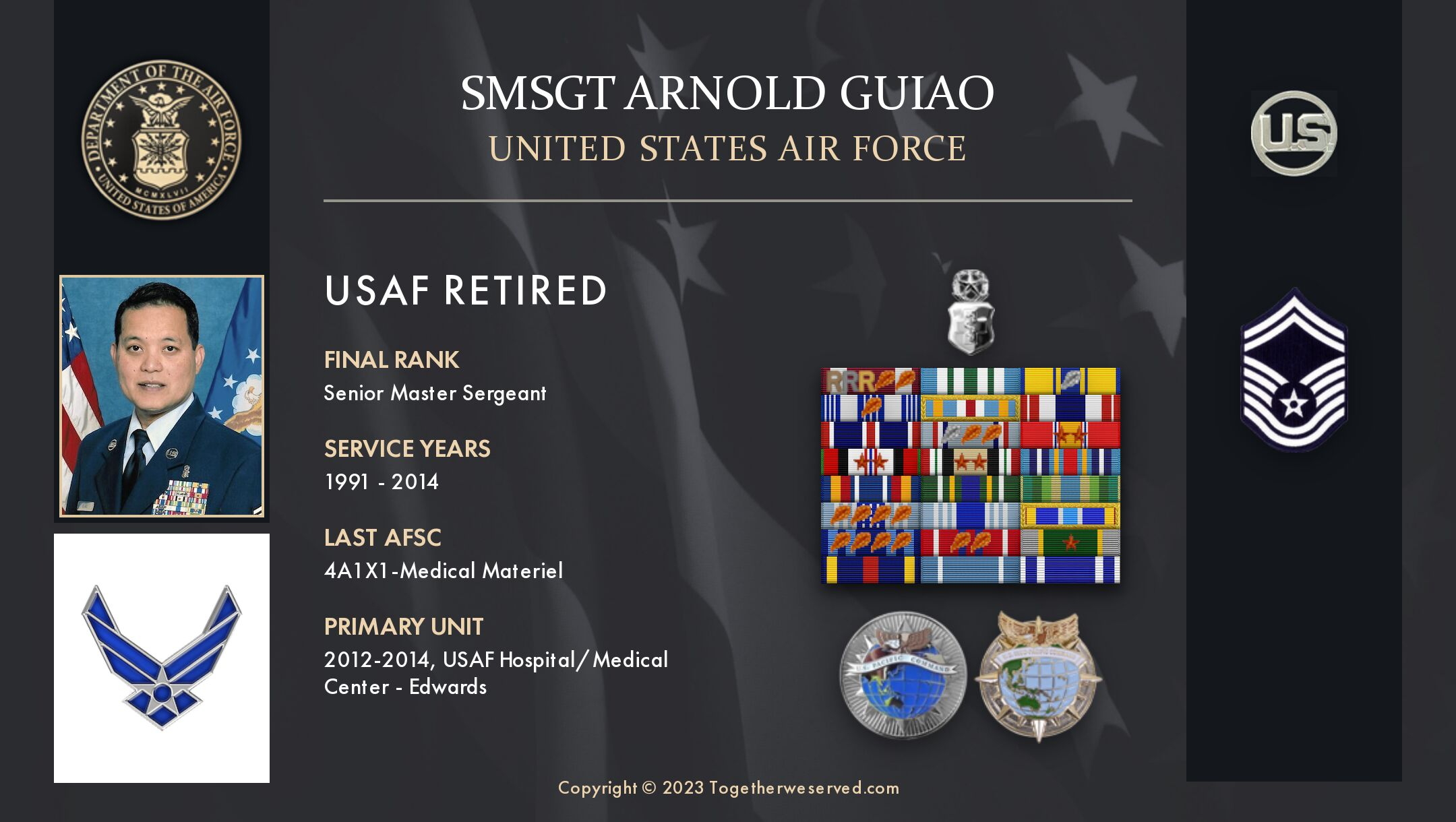
0 Comments